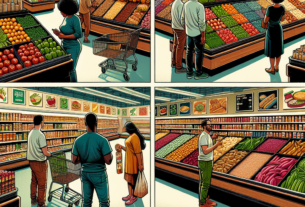The Biggest Grocery Retail Chains in the Top 10 Largest Economies
In 2025, the global grocery retail industry is experiencing significant growth and transformation. This report will focus on the biggest grocery retail chains in the top 10 largest economies around the world, analyzing their financials, market share, volumes, and future plans.
United States
The United States is home to some of the largest grocery retail chains in the world. Walmart, Kroger, and Costco are the top players in the market, with Walmart leading the pack in terms of market share and revenue. In 2024, Walmart reported revenues of over $500 billion, making it the largest grocery retailer in the country.
Walmart
Walmart operates over 5,000 stores in the United States and has a strong online presence through its e-commerce platform. The company has been investing heavily in technology and automation to improve its supply chain and enhance customer experience. Walmart’s future plans include expanding its online grocery delivery service and introducing more sustainable products to its shelves.
Kroger
Kroger is the second-largest grocery retailer in the United States, with revenues exceeding $100 billion in 2024. The company operates over 2,700 stores across the country and has been focusing on enhancing its digital capabilities to compete with online retailers. Kroger’s future plans include launching new private label brands and expanding its online grocery delivery service.
China
China is the second-largest economy in the world and has a rapidly growing grocery retail market. Alibaba, JD.com, and Sun Art Retail Group are the leading players in the Chinese market, with Alibaba holding the largest market share.
Alibaba
Alibaba is a major player in the Chinese grocery retail market, offering a wide range of products through its online platform. The company reported revenues of over $100 billion in 2024 and has been expanding its offline presence through partnerships with traditional retailers. Alibaba’s future plans include investing in new technologies such as AI and robotics to improve its supply chain efficiency.
JD.com
JD.com is another key player in the Chinese grocery retail market, with revenues exceeding $50 billion in 2024. The company operates a vast logistics network that enables fast delivery of groceries to customers across the country. JD.com’s future plans include expanding its grocery retail business internationally and investing in sustainable practices.
Japan
Japan has a mature grocery retail market dominated by companies such as Aeon, Seven & i Holdings, and Ito-Yokado. Aeon is the largest grocery retailer in Japan, with a strong presence in both offline and online channels.
Aeon
Aeon operates over 1,000 stores in Japan and reported revenues of over $50 billion in 2024. The company has been investing in digital transformation to enhance its customer experience and improve operational efficiency. Aeon’s future plans include expanding its e-commerce business and introducing more sustainable products to its stores.
Seven & i Holdings
Seven & i Holdings is another major player in the Japanese grocery retail market, with revenues exceeding $40 billion in 2024. The company operates convenience stores, supermarkets, and hypermarkets under various brands. Seven & i Holdings’ future plans include expanding its overseas presence and investing in new technologies to drive growth.
Germany
Germany has a competitive grocery retail market with companies such as Edeka, Aldi, and Rewe leading the pack. Edeka is the largest grocery retailer in Germany, with a market share of over 25%.
Edeka
Edeka operates a network of independent retailers across Germany and reported revenues of over $60 billion in 2024. The company has been focusing on sustainability and local sourcing to meet consumer demand for ethical products. Edeka’s future plans include expanding its online grocery delivery service and investing in renewable energy.
Aldi
Aldi is a major player in the German grocery retail market, with revenues exceeding $40 billion in 2024. The company operates discount supermarkets that offer a limited selection of products at low prices. Aldi’s future plans include expanding its store network internationally and introducing more organic and sustainable products to its shelves.
United Kingdom
The United Kingdom has a highly competitive grocery retail market dominated by companies such as Tesco, Sainsbury’s, and Asda. Tesco is the largest grocery retailer in the UK, with a market share of over 25%.
Tesco
Tesco operates over 3,000 stores in the UK and reported revenues of over $50 billion in 2024. The company has been investing in technology and data analytics to personalize the shopping experience for its customers. Tesco’s future plans include expanding its online grocery delivery service and reducing plastic waste in its stores.
Sainsbury’s
Sainsbury’s is another key player in the UK grocery retail market, with revenues exceeding $30 billion in 2024. The company operates supermarkets and convenience stores under various brands. Sainsbury’s future plans include investing in sustainability initiatives and enhancing its product range to meet changing consumer preferences.
India
India has a rapidly growing grocery retail market with companies such as Reliance Retail, Future Group, and Tata Group leading the pack. Reliance Retail is the largest grocery retailer in India, with a market share of over 20%.
Reliance Retail
Reliance Retail operates a network of supermarkets and hypermarkets across India and reported revenues of over $30 billion in 2024. The company has been focusing on digital transformation and omni-channel retailing to enhance customer experience. Reliance Retail’s future plans include expanding its store network and launching new private label brands.
Future Group
Future Group is another major player in the Indian grocery retail market, with revenues exceeding $20 billion in 2024. The company operates a variety of retail formats, including supermarkets, hypermarkets, and convenience stores. Future Group’s future plans include diversifying its product range and investing in technology to drive growth.
Brazil
Brazil has a large and diverse grocery retail market with companies such as Grupo Pão de Açúcar, Carrefour, and Walmart Brasil leading the pack. Grupo Pão de Açúcar is the largest grocery retailer in Brazil, with a market share of over 15%.
Grupo Pão de Açúcar
Grupo Pão de Açúcar operates a network of supermarkets and hypermarkets across Brazil and reported revenues of over $20 billion in 2024. The company has been focusing on sustainability and social responsibility to build trust with customers. Grupo Pão de Açúcar’s future plans include expanding its online grocery delivery service and launching new loyalty programs.
Carrefour
Carrefour is another major player in the Brazilian grocery retail market, with revenues exceeding $15 billion in 2024. The company operates supermarkets, hypermarkets, and convenience stores under various brands. Carrefour’s future plans include investing in digital transformation and expanding its store network in key cities.
Russia
Russia has a fast-growing grocery retail market with companies such as X5 Retail Group, Magnit, and Lenta leading the pack. X5 Retail Group is the largest grocery retailer in Russia, with a market share of over 20%.
X5 Retail Group
X5 Retail Group operates a network of supermarkets and convenience stores across Russia and reported revenues of over $15 billion in 2024. The company has been focusing on expanding its store network in underserved regions and enhancing its online grocery delivery service. X5 Retail Group’s future plans include launching new private label brands and investing in sustainability initiatives.
Magnit
Magnit is another major player in the Russian grocery retail market, with revenues exceeding $10 billion in 2024. The company operates convenience stores and hypermarkets in urban and rural areas. Magnit’s future plans include improving its supply chain efficiency and launching new customer loyalty programs.
Indonesia
Indonesia has a large and diverse grocery retail market with companies such as PT. Hero Supermarket, PT. Matahari Putra Prima, and PT. Lotte Shopping Indonesia leading the pack. PT. Hero Supermarket is the largest grocery retailer in Indonesia, with a market share of over 15%.
PT. Hero Supermarket
PT. Hero Supermarket operates a network of supermarkets and hypermarkets across Indonesia and reported revenues of over $5 billion in 2024. The company has been focusing on expanding its store network in key cities and enhancing its online grocery delivery service. PT. Hero Supermarket’s future plans include launching new private label brands and investing in digital transformation.
PT. Matahari Putra Prima
PT. Matahari Putra Prima is another major player in the Indonesian grocery retail market, with revenues exceeding $3 billion in 2024. The company operates supermarkets and hypermarkets under various brands. PT. Matahari Putra Prima’s future plans include diversifying its product range and expanding its store network in secondary cities.
Mexico
Mexico has a large and competitive grocery retail market with companies such as Walmart de Mexico, Soriana, and Chedraui leading the pack. Walmart de Mexico is the largest grocery retailer in Mexico, with a market share of over 20%.
Walmart de Mexico
Walmart de Mexico operates a network of supermarkets and hypermarkets across Mexico and reported revenues of over $20 billion in 2024. The company has been focusing on sustainability and social responsibility to build trust with customers. Walmart de Mexico’s future plans include expanding its online grocery delivery service and launching new customer loyalty programs.
Soriana
Soriana is another major player in the Mexican grocery retail market, with revenues exceeding $10 billion in 2024. The company operates supermarkets and convenience stores in urban and rural areas. Soriana’s future plans include improving its supply chain efficiency and enhancing its product range to meet changing consumer preferences.
Conclusion
In conclusion, the biggest grocery retail chains in the top 10 largest economies around the world are experiencing significant growth and transformation. Companies are investing in technology, sustainability, and customer experience to stay competitive in the market. As consumer preferences evolve, grocery retailers will need to adapt and innovate to meet changing demands.
For more information on the state of the global grocery retail industry in 2025, visit CulinaryCoverage.com.



